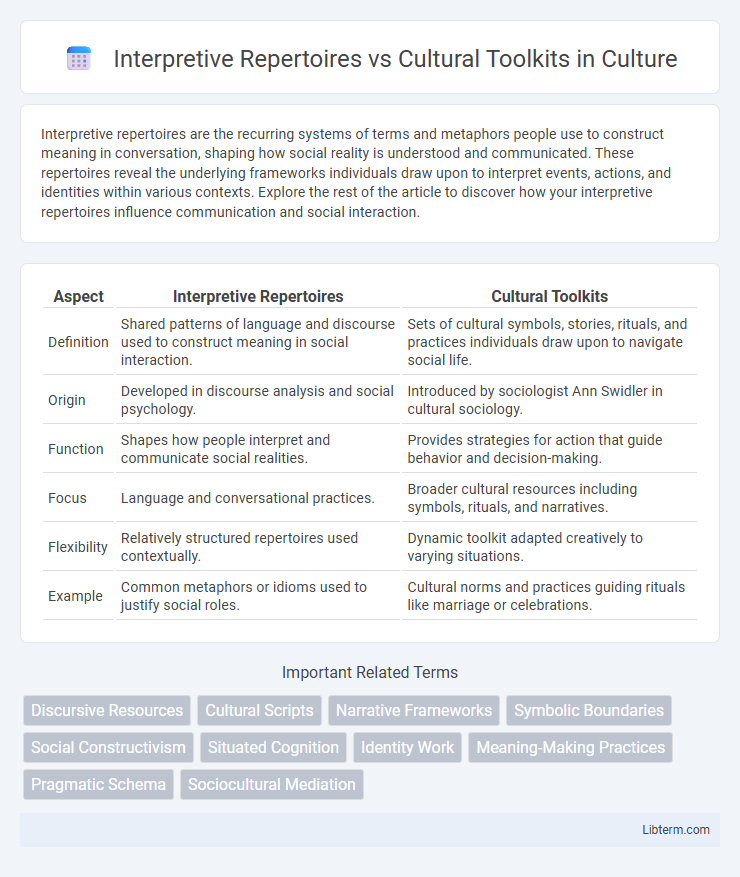Interpretive repertoires are the recurring systems of terms and metaphors people use to construct meaning in conversation, shaping how social reality is understood and communicated. These repertoires reveal the underlying frameworks individuals draw upon to interpret events, actions, and identities within various contexts. Explore the rest of the article to discover how your interpretive repertoires influence communication and social interaction.
Table of Comparison
| Aspect | Interpretive Repertoires | Cultural Toolkits |
|---|---|---|
| Definition | Shared patterns of language and discourse used to construct meaning in social interaction. | Sets of cultural symbols, stories, rituals, and practices individuals draw upon to navigate social life. |
| Origin | Developed in discourse analysis and social psychology. | Introduced by sociologist Ann Swidler in cultural sociology. |
| Function | Shapes how people interpret and communicate social realities. | Provides strategies for action that guide behavior and decision-making. |
| Focus | Language and conversational practices. | Broader cultural resources including symbols, rituals, and narratives. |
| Flexibility | Relatively structured repertoires used contextually. | Dynamic toolkit adapted creatively to varying situations. |
| Example | Common metaphors or idioms used to justify social roles. | Cultural norms and practices guiding rituals like marriage or celebrations. |
Introduction to Interpretive Repertoires and Cultural Toolkits
Interpretive repertoires refer to recurring systems of terms, descriptions, and figures of speech that individuals draw upon to construct meaning and navigate social interactions. Cultural toolkits represent a broader set of cognitive and symbolic resources, including values, skills, and narratives, that people use to shape behaviors and interpret their cultural environment. Both concepts highlight how individuals actively deploy cultural resources to make sense of the world and manage everyday life.
Theoretical Foundations: Discourse vs. Culture
Interpretive repertoires are grounded in discourse theory, emphasizing language as a dynamic resource people use to construct social reality through repeated patterns of talk. Cultural toolkits stem from cultural sociology, viewing culture as a repertoire of shared symbols, narratives, and practices individuals draw upon to navigate social life. The theoretical foundation of interpretive repertoires prioritizes micro-level interaction and discursive strategies, while cultural toolkits focus on meso- and macro-level cultural schemas shaping behavior and identity.
Defining Interpretive Repertoires
Interpretive repertoires are recurring systems of terms, descriptions, and figures of speech that people use to construct and negotiate meaning in social interactions. They function as flexible, culturally grounded vocabularies that help individuals interpret experiences and shape narratives within specific contexts. This concept contrasts with cultural toolkits, which encompass broader sets of habits, skills, and values guiding behavior across various situations.
Understanding Cultural Toolkits
Cultural toolkits consist of shared symbols, stories, and practices that individuals draw upon to navigate social situations and construct identities, emphasizing the dynamic and adaptable nature of culture. These toolkits provide a flexible range of cultural resources that help explain how people interpret experiences and make decisions across diverse contexts. Understanding cultural toolkits highlights the role of collective knowledge in shaping individual behavior and maintaining cultural continuity.
Key Similarities Between Interpretive Repertoires and Cultural Toolkits
Interpretive repertoires and cultural toolkits both function as frameworks individuals draw upon to make sense of social interactions and navigate cultural contexts. Each concept emphasizes learned patterns of language, behavior, and meaning that guide interpretations and actions within specific social settings. Both highlight the dynamic, flexible use of shared cultural resources to construct identity and coordinate social life.
Main Differences: Perspectives and Applications
Interpretive Repertoires emphasize flexible, context-dependent language resources individuals draw upon in social interactions, highlighting discourse and everyday communication patterns. Cultural Toolkits focus on broader sets of cultural symbols, knowledge, and practices individuals utilize to navigate social situations, stressing cultural frameworks and decision-making processes. While Interpretive Repertoires analyze dynamic conversational strategies, Cultural Toolkits explore structured cultural resources shaping identities and behaviors.
Examples in Everyday Social Interactions
Interpretive repertoires are recurring patterns of language and thought that people use to make sense of social situations, such as using narratives about fairness when negotiating workplace roles. Cultural toolkits refer to a broader set of cultural resources, including symbols, stories, and skills that individuals draw from in everyday interactions, like deploying gestures or customs during family gatherings to express respect. In daily life, people might invoke interpretive repertoires when explaining a friend's behavior through common stereotypes, while using cultural toolkits when adapting to unfamiliar social settings by applying learned cultural norms.
Implications for Sociological Research
Interpretive repertoires offer sociological research a framework for understanding how individuals use language to construct social realities through shared discursive resources, highlighting micro-level interactions and meaning-making processes. In contrast, cultural toolkits emphasize the repertoire of cultural symbols, narratives, and practices individuals draw upon to navigate social life, focusing on the broader socio-cultural context and identity formation. Integrating both concepts enhances the analysis of how language and culture mutually shape social behavior, identity, and power dynamics within diverse populations.
Critiques and Limitations of Both Concepts
Interpretive repertoires often face criticism for their limited flexibility in explaining individual agency within dynamic social contexts, as they tend to emphasize fixed patterns of language use. Cultural toolkits are challenged for potentially overlooking power dynamics and structural inequalities by portraying individuals as rational actors selectively using cultural resources. Both concepts may underrepresent the complexity of intersectional identities and the influence of evolving sociopolitical environments on meaning-making processes.
Conclusion: Synthesizing Insights and Future Directions
Interpretive repertoires and cultural toolkits both conceptualize the frameworks individuals use to interpret and navigate social life, with interpretive repertoires emphasizing recurring linguistic patterns and cultural toolkits highlighting a broader range of symbolic resources. Synthesizing these insights suggests an integrated approach that recognizes how language practices operate within wider cultural resources to shape identity and social interaction. Future research should explore the dynamic interplay between these frameworks, examining how shifting repertoires and evolving toolkits influence social behavior in diverse cultural contexts.
Interpretive Repertoires Infographic

 libterm.com
libterm.com